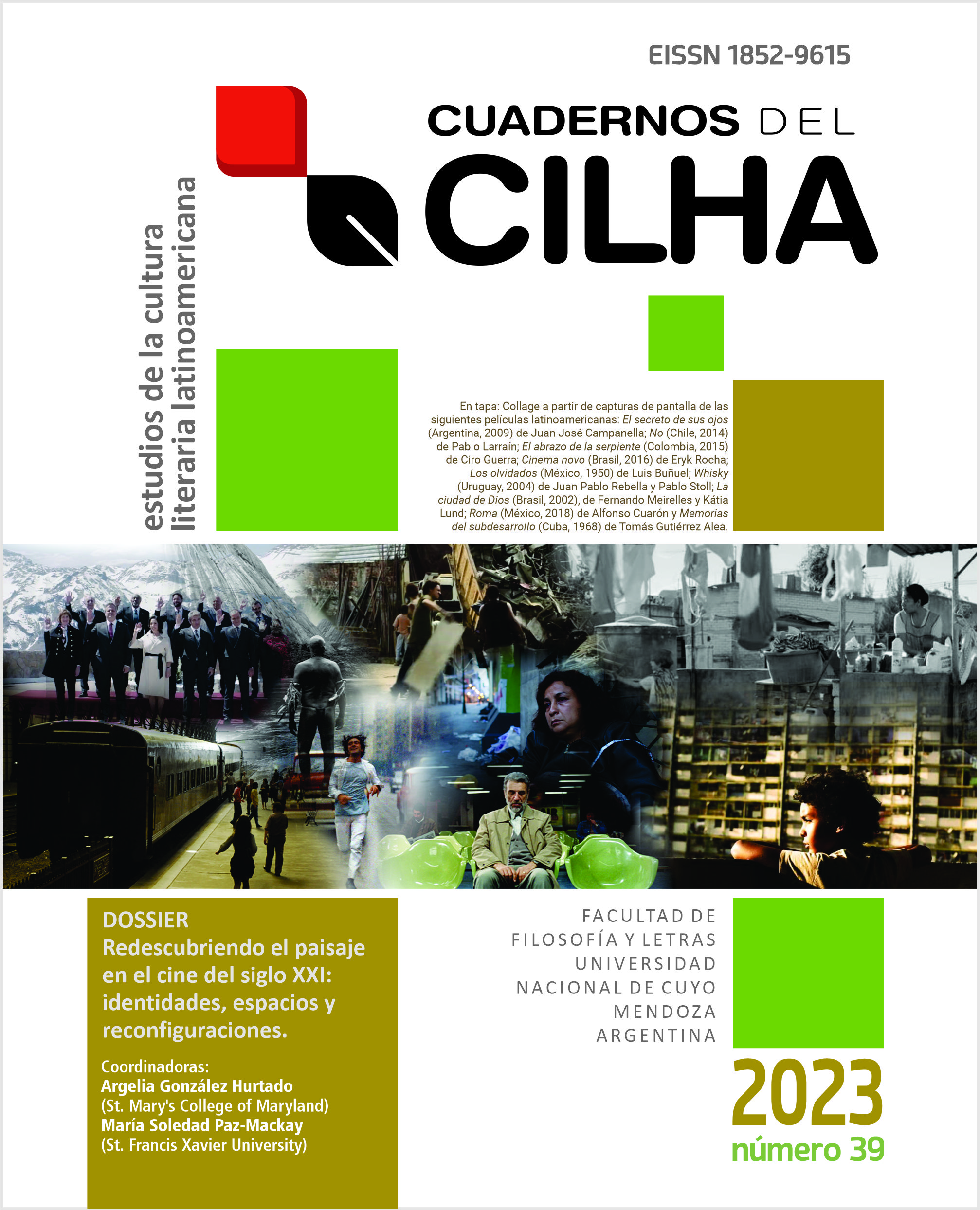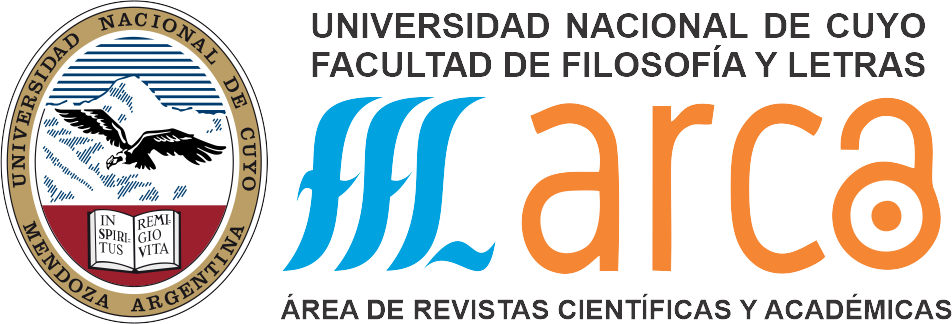A northern grammar: filming from Salta.
Micropolitics of space and orality in the cinema of Lucrecia Martel
DOI:
https://doi.org/10.48162/rev.34.073Keywords:
Lucrecia Martel, contemporary Argentine cinema, micropolitics of space, oralityAbstract
In this article, I will observe two omnipresent mechanisms in the cinematography of Lucrecia Martel. In the first place, I will analyze in the film La ciénaga (2001) a political urgency to inquire into microspaces, through an obsessive gaze, a mechanism that I consider runs through her project from one extreme to the other. Secondly, in the short film Nueva Argirópolis (2010) I will analyze what I call an oral cinema, that is, a cinema with a total pre-eminence of orality and voice. Martel postulates in her films a politics of voices, which she has specifically located as "a grammar from the north", clearly justifying the placement of “speech from Salta against the devaluation of the word". As I will expand on in this article, I propose that this politics of voices is the most radical mechanism for breaking with a previous cinema, and, at the same time, it is the operation that definitively turns Martel's cinema into a project that brings with it a decentralizing gesture. in the Argentine cultural field. In this sense, there is a key political decision that runs through her films as a general operating framework and that I will analyze in detail: filming from Salta. I believe that Martel's film project designs new provincial routes for Argentine cinema and works from exceptionally investigated spaces and perspectives within a national film tradition. In addition, in her “filming from Salta” she investigates localized conflicts that had never been observed from a cinematographic perspective, without settling for simplifying visions of certain cartographies.
References
Aguilar, G. (2010). Otros mundos. Un ensayo sobre el nuevo cine argentino. Santiago Arcos editor.
Andermann, J. (2012). New Argentine Cinema. I. B. Tauris.
Aristarain, A. (Director). (1992). Un lugar en el mundo. [Película]. Tesela Aristarain.
Benjamin, W. (2007). La tarea del traductor. En Conceptos de filosofía de la historia (pp. 77-90). Terramar.
Birri, F. (Director). (1960). Tire dié [Película]. Instituto de Cinematografía de la Universidad Nacional del Litoral.
Birri, F. (Director). (1962). Los inundados [Película]. Productora América Nuestra.
Busqued, C. (2009). Bajo este sol tremendo. Anagrama.
Caetano, A. (Director). (2017). El otro hermano [Película]. Rizoma.
Cairo, H. (Director). (1915). Nobleza gaucha [Película]. Cairo Films.
Capelli, M. y Diz, J. (2011). Lucrecia Martel: entrevista con la directora salteña. Alquimia silvestre. Los inrockuptibles, 215. http://www.losinrocks.com/wp-content/uploads/2011/01/martel-125.pdf
Castro Cobos, M. y Sarmiento Hinojosa, J. [José Sarmiento Hinojosa] (6 de septiembre de 2010). Entrevista: Lucrecia Martel (1) [Video]. Youtube. https://www.youtube.com/watch?v=QFITzNaygkE
Chukhrai, G. (Director). (1959). La balada del soldado [Película]. Ministerstvo Kinematografii.
Cohn, M. y Duprat, G. (Directores). (2016). El ciudadano ilustre [Película]. Aleph Media, Televisión Abierta, A Contracorriente Films, Magma Cine.
D’Alessandro, N. (2022). Una extinción en la idea de paisaje en la cinematografía de Lucrecia Martel. Imagofagia. Revista de la Asociación de Estudios de Cine y Audiovisual, 26, 8-36.
Deleuze, G. (1984). La imagen movimiento. Estudios sobre cine 1. Paidós.
Demaría, L. (2014). Buenos Aires y las provincias. Relatos para desarmar. Beatriz Viterbo.
Greca, A. (1917). El último malón [Película]. Greca Films.
Guattari, F. y Rolnik, S. (2006). Micropolítica. Cartografías del deseo. Traficantes de sueños.
La Nación. (19 de septiembre de 2016). El folklore me ha parecido siempre una categoría inútil. https://www.lanacion.com.ar/espectaculos/musica/lucrecia-martel-el-folklore-me-ha-parecido-siempre-una-categoria-inutil-nid1939360/
Martel, L. (2013). Territorios transitables. En F. Ingrassia (Comp.), Estéticas de la dispersión (pp. 67-76). Beatriz Viterbo.
Martel, L. (Directora). (1995). Rey muerto [Película]. Instituto Nacional de Cinematografía y Artes Audiovisuales.
Martel, L. (Directora). (2001). La ciénaga [Película]. Home Vision Entertainment, .
Martel, L. (Directora). (2004). La niña santa [Película]. El Deseo.
Martel, L. (Directora). (2008). La mujer sin cabeza [Película]. Strand Releasing Home Video.
Martel, L. (Directora). (2010). Nueva Argirópolis [Película]. Productora María Onis.
Martin, D. (2016a). The Cinema of Lucrecia Martel. Manchester University Press.
Martin, D. (2016b). Lucrecia Martel’s Nueva Argirópolis: Rivers, Rumours and Resistance. Journal of Latin American Cultural Studies, 25(3), 449-465.
Martínez, J. (s. f.). Lucrecia Martel: entrevista. Esto no es una revista, 07. http://www.estonoesunarevista.com.ar/martel.html
Metz, C. (2015). Impersonal Enunciation. The Place of Film. Columbia University Press.
Nodal Cultura. Noticias de América Latina y el Caribe. (22 de julio de 2016). Lucrecia Martel: «El mal de la Argentina es la búsqueda frenética, patriótica, de la identidad». http://www.nodalcultura.am/2016/07/lucrecia-martel-el-mal-de-la-argentina-es-la-busqueda-frenetica-patriotica-de-la-identidad/
Oubiña, D. (2007). Estudio crítico sobre La ciénaga. Entrevista a Lucrecia Martel. Picnic Editorial.
Oumano, E. (2011). Cinema Today. A Conversation with Thirty-nine Filmmakers from around the World. Rutgers University Press.
Patocco, P. (2011). El cine es una forma de participación política. En P. Patocco (Comp.), Diálogos 2010. Ciclo de entrevistas culturales (pp. 87-98). Artenautas.
Pivín, J. (10 de septiembre de 2011). Diccionario o glosario de la Jerga Policial argentina, que incluye términos usados por delincuentes y habla popular argentina. http://pagina1-josepivin.blogspot.com/2011/09/diccionario-o-glosario-de-la-jerga.html
Pizarnik, A. (2004). Poesía completa. Lumen.
Prieto, M. (2006). Breve historia de la literatura argentina. Taurus.
Salas, H. y Schwarzbock, S. (2001). El verano de nuestro descontento. Género y violencia en La ciénaga. El amante, 108, 10-12.
Sarmiento, D. F. (1916). Argirópolis o la capital de los estados confederados del Río de la Plata. La Cultura Argentina.
Sorín, C. (Director). (2004). El perro [Película]. OK Films S. A., Guacamole Films, Wanda Visión.
Trapero, P. (Director). (2004). Familia rodante [Película]. Matanza Cine, Lumina Films, Paradis Films, Axiom Films, Pandora, Pol-Ka Producciones.
Varas, P. y Dash, R. C. (2007). (Re)imaginando la nación argentina: Lucrecia Martel y La ciénaga. En V. Rangil (Ed.), El cine argentino de hoy: entre el arte y la política (pp. 191-207). Editorial Biblos.
Williams, R. (2002). El campo y la ciudad. Paidós.





















